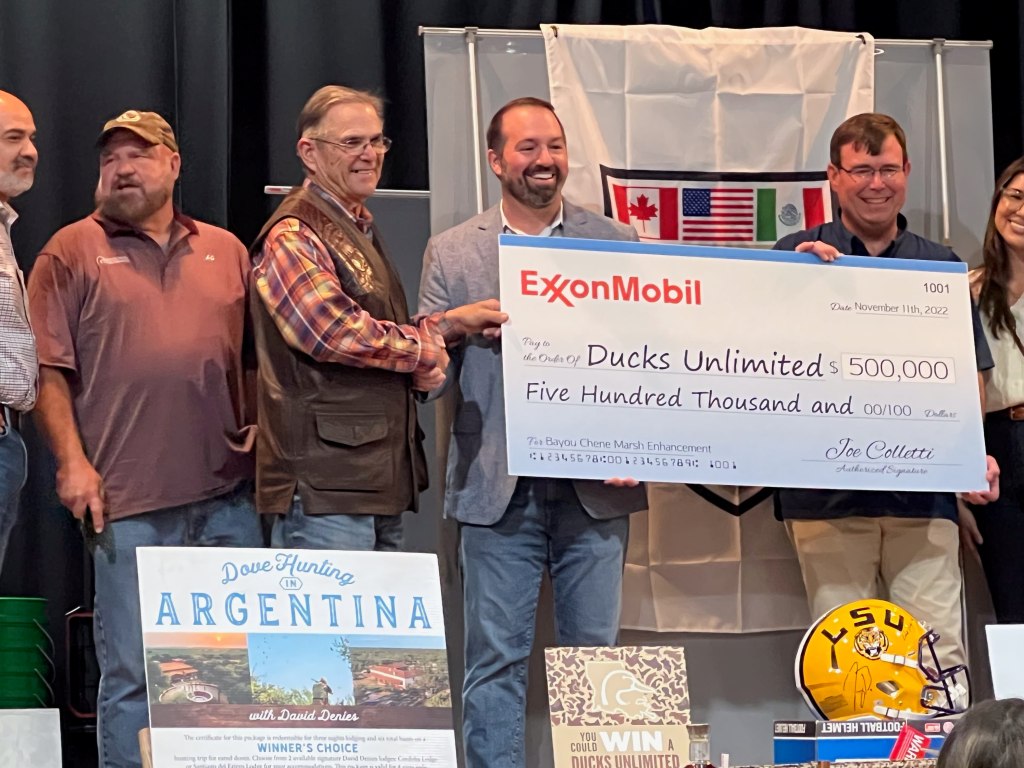ExxonMobil’s $500,000 donation presented at Pecan Island DU event
Published 5:00 am Sunday, November 20, 2022

- P.R. Burke of New Iberia (plaid shirt and vest) proudly holds one end of an enlarged check for $500,000 while shaking hands with Joe J. Colletti of Baton Rouge, formerly of Jeanerette, Friday night at a Ducks Unlimited banquet Nov. 11 in Pecan Island. Also pictured fully are Jay Owen of Lafayette, standing to Burke's right, and Mike Smith of Baton Rouge.
PECAN ISLAND – The power of a dynamic partnership wowed a large, enthusiastic crowd and, even, the primary players when ExxonMobil donated $500,000 to Ducks Unlimited at a DU general membership banquet Nov. 11 in Pecan Island.
Porteus Burke of New Iberia, a lawyer, author and long-time DU member, was one of the dedicated outdoorsmen instrumental in acquiring half-a-million dollars from ExxonMobil for the Bayou Chenes Project in Vermilion Parish. Burke held the enlarged presentation check along with Joe Colletti, a former Jeanerette resident who works as the business development manager for acquisition and divestitures for ExxonMobil in Baton Rouge.
Trending
“It was a very favorable reaction when we explained this money is to be put back in the land,” Burke, 76, said.
Others on hand to present the donation included Bob Dew of Lafayette, DU Senior Director of Development for Louisiana; Brandon Maxwell of Houston, ExxonMobil official; Jay Owen, who serves on the DU National Board of Directors, and Mike Smith of Baton Rouge.
Dew said more than 250 DU members attended the fundraising event here at the old school building now owned by David John of Crowley. The banquet-goers, pumped up for the 2022-23 season opener the following day in the West Zone, enjoyed char-broiled oysters and steaks catered by Shucks in Abbeville.
The Vicksburg, Mississippi, native who moved to Lafayette in 2003, agreed with Burke and said, “Everybody was excited. It was a great, great night. ExxonMobil has been a supporter of DU for over 25 years. Up until now the total given to DU (by ExxonMobil) is $1 million over 25 years.”
Dew, 50, said the $500,000 is earmarked for the Bayou Chenes Project that will benefit 900 acres in Vermilion Parish on property owned by the Vermilion Corp. The two-phase project involves building a low-level rock weir to help restore hydrology and a technique called marsh terracing in which long, linear strips of marsh reduce wave action and promote grass growth.
The DU Director of Development tipped his cap to Colletti.
Trending
“He was instrumental in the huge effort, getting ExxonMobil support. Also Brandon Maxwell,” Dew said.
DU’s engineering staff came up with a plan two years ago with an initial cost between $800,000-$900,000. Like everything else, he said, the cost increased 30 percent.
“We were getting nervous we wouldn’t be able to complete the project. ExxonMobil allows us to do the project. ExxonMobil stepped in,” Dew said.
The project also benefitted from a $1 million grant from the North American Wetlands Conservation Act, he said. Administered by the U.S. Fish and Wildlife Service, the program provides funds for the protection and management of wetland habitats for migratory birds and other wildlife in the U.S., Mexico and Canada.
Dew said work on the project is scheduled to begin this week.
Burke, author of Great Game Paradise, an in-depth history of the 125,000-acre marshland under private land management, is as passionate about duck hunting as he is about conservation. After Friday’s fundraiser, he hunted ducks for three straight days in Vermilion Parish.
“As president and board chairman of the Vermilion Corp., I’m always in contact with MobilExxon. We consistently mentioned to ExxonMobil that DU would be a proper recipient,” he said, noting the conservation organization constantly engages in marsh restoration.
“I explain to people that 90 percent of wetlands in southwest Louisiana are privately owned. However, the ducks don’t know that” so they settle wherever prime habitat is available at the time, he said.
“If we don’t have a good place for ducks, we don’t have a good place for anything else. We’ve got to preserve what we have and restore it.
“We are working strenuously to keep it (ExxonMobil donations) alive on an annual basis. We’re all hoping this can become an annual event, an annual giving and we’re working toward that right now.”
If no one preserves the marsh, it’s possible it could be wiped out in the future, he said. He likened the struggle to preserve, maintain and restore the marsh as constantly rolling a stone up a mountain.
“However, you can’t stop trying,” he said.





